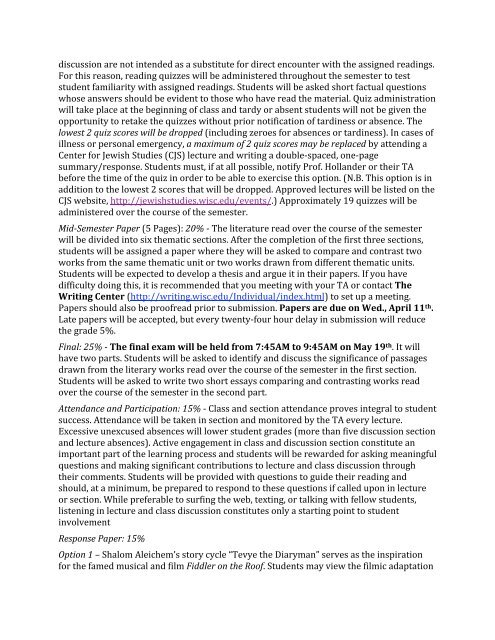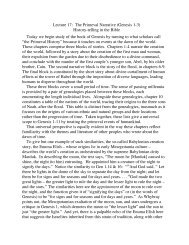Modern Jewish Literature - Department of Hebrew & Semitic Studies ...
Modern Jewish Literature - Department of Hebrew & Semitic Studies ...
Modern Jewish Literature - Department of Hebrew & Semitic Studies ...
You also want an ePaper? Increase the reach of your titles
YUMPU automatically turns print PDFs into web optimized ePapers that Google loves.
discussion are not intended as a substitute for direct encounter with the assigned readings.<br />
For this reason, reading quizzes will be administered throughout the semester to test<br />
student familiarity with assigned readings. Students will be asked short factual questions<br />
whose answers should be evident to those who have read the material. Quiz administration<br />
will take place at the beginning <strong>of</strong> class and tardy or absent students will not be given the<br />
opportunity to retake the quizzes without prior notification <strong>of</strong> tardiness or absence. The<br />
lowest 2 quiz scores will be dropped (including zeroes for absences or tardiness). In cases <strong>of</strong><br />
illness or personal emergency, a maximum <strong>of</strong> 2 quiz scores may be replaced by attending a<br />
Center for <strong>Jewish</strong> <strong>Studies</strong> (CJS) lecture and writing a double‐spaced, one‐page<br />
summary/response. Students must, if at all possible, notify Pr<strong>of</strong>. Hollander or their TA<br />
before the time <strong>of</strong> the quiz in order to be able to exercise this option. (N.B. This option is in<br />
addition to the lowest 2 scores that will be dropped. Approved lectures will be listed on the<br />
CJS website, http://jewishstudies.wisc.edu/events/.) Approximately 19 quizzes will be<br />
administered over the course <strong>of</strong> the semester.<br />
MidSemester Paper (5 Pages): 20% ‐ The literature read over the course <strong>of</strong> the semester<br />
will be divided into six thematic sections. After the completion <strong>of</strong> the first three sections,<br />
students will be assigned a paper where they will be asked to compare and contrast two<br />
works from the same thematic unit or two works drawn from different thematic units.<br />
Students will be expected to develop a thesis and argue it in their papers. If you have<br />
difficulty doing this, it is recommended that you meeting with your TA or contact The<br />
Writing Center (http://writing.wisc.edu/Individual/index.html) to set up a meeting.<br />
Papers should also be pro<strong>of</strong>read prior to submission. Papers are due on Wed., April 11 th .<br />
Late papers will be accepted, but every twenty‐four hour delay in submission will reduce<br />
the grade 5%.<br />
Final: 25% ‐ The final exam will be held from 7:45AM to 9:45AM on May 19 th . It will<br />
have two parts. Students will be asked to identify and discuss the significance <strong>of</strong> passages<br />
drawn from the literary works read over the course <strong>of</strong> the semester in the first section.<br />
Students will be asked to write two short essays comparing and contrasting works read<br />
over the course <strong>of</strong> the semester in the second part.<br />
Attendance and Participation: 15% ‐ Class and section attendance proves integral to student<br />
success. Attendance will be taken in section and monitored by the TA every lecture.<br />
Excessive unexcused absences will lower student grades (more than five discussion section<br />
and lecture absences). Active engagement in class and discussion section constitute an<br />
important part <strong>of</strong> the learning process and students will be rewarded for asking meaningful<br />
questions and making significant contributions to lecture and class discussion through<br />
their comments. Students will be provided with questions to guide their reading and<br />
should, at a minimum, be prepared to respond to these questions if called upon in lecture<br />
or section. While preferable to surfing the web, texting, or talking with fellow students,<br />
listening in lecture and class discussion constitutes only a starting point to student<br />
involvement<br />
Response Paper: 15%<br />
Option 1 – Shalom Aleichem’s story cycle “Tevye the Diaryman” serves as the inspiration<br />
for the famed musical and film Fiddler on the Ro<strong>of</strong>. Students may view the filmic adaptation



